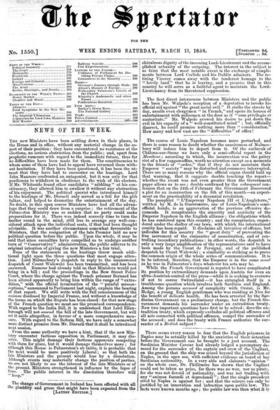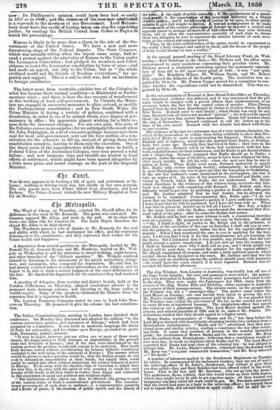NEWS OF THE WEEK.
THE new Ministers have been settling down in their _places, in the House and in office, without any material change in the as- pect -of their position : they have encountered no resistance at the elections, no serious obstruction from the public ; and, apart from prophetic rumours with regard to the immediate future, thus far no difficulties have been made for them. The constituencies to whom some of them have had to appeal have returned them with- out hesitation. If they have been, questioned, it has been the ut- most that they have had to encounter on the hustings. Lord John Manners confronted an antagonist, but it was only for that gentleman to withdraw in obedience to. the wish of the electors. If Mr. Whiteside found other candidates " nibbling " at his con- stituency; they allowed him.to swallow it without any abstraction of his enjoyment. The political querist who introduced himself to the hustings of Mr. Disraeli only served' as a-foil for the glib talker, and helped to dramatize the entertainment of the day. No doubt, in this open course Ministers have . had all the advan- tage that they could draw from a surprise ; the retirement of the Palmerston Ministry was so sudden that no party could make preparations for it. There was indeed scarcely time to turn the matter round in the mind, still less to arrange any well-con- sidered attack upon the individual seats, if that had been thought advisable. It was another circumstance somewbat favourable to Ministers, that the resignation of the late Premier laid no new political'question before the public. Upon the whole, it may be said that since casualties have compelled us to undergo another turn of " Conservative " administration, the public adheres to its original intention of giving the new Ministers a fair trial.
None of the statements on the hustings threw much addi- tional light upon the three questions that most engage atten- tion. Lord Malmesbury's despatch in reply to the unanswered despatch of Count Walewski has been transmitted, and has been answered. Rumour had already told us that Ministers would not bring in -a bill ; and the proceedings in the Bow Street Police Court, where the charge against the French prisoner Bernard has been altered apparently to bring him within the range of "extra- dition," with the official termination of the " painful miscon- ceptions," announced to Parliament last night, explain the bearing of that report. We still write with the-full consciousness of the animus disclosed by Imperial France, and without a knowledge of the terms on which the dispute has been closed : for that new stage of the French question we must see the promised correspondence. With regard to the India Bill, it is understood that Lord Ellen- borough will not amend the bill of the late Government, but will set it aside altogether, in favour of a more comprehensive mea- sure. With regard to the Reform Bill, we have only a somewhat more distinct promise from Mr. Disraeli that it shall be introduced next session.
From the same authority we have a hint, that if the new Min- istry encounter factious opposition in Parliament, it may dis- solve. This might damage their factious opponents Competing with them for place, but it would damage themselves more; for although this House is Palmerston's ab initio, it is probable that the next would be more positively Liberal; so that both the late Ministers and the present would lose by a dissolution. Although events may materially change the position of parties, we are not likely to see the interest of the late Ministers or of the present. Ministers strengthened in influence by the lapse of time. The public interest in the dissolution 'therefore will " keep."
The change of Government in Ireland has been effected with all the placidity and grace that might have been expected from the [LATEST EDITION.]
chivalrous dignity of the incoming Lord-Lieutenant and the accom- plished urbanity of the outgoing. The interest in the subject is so faint that the most notable event is the exchange of compli- ments between Lord Carlisle and his Dublin admirers. The re- tiring Viceroy comes away with the tenderest homage to the ".lovely land " that he is leaving, and a promise that in this country he will serve as a faithful agent to maintain the Lord- Lieutenancy from its threatened suppression.
The first direct intercourse between Ministers and the public has been Mr. Walpole's reception of a deputation to invoke his official aid against " the great social evil." It stalks the streets by day, assails even clergymen "in French," and opens its houses of entertainment with policemen at the door as if " cum privilegio et auctoritate." Mr. Walpole avowed his desire to put down the
evil in his capacity of well-constituted mind" ; but, officially discreet, he could promise nothing more than " consideration," How many and hew vast are the " difficulties" of office The course of Louis Napoleon becomes more perturbed, and there is some reason to doubt whether the suasiveness of Malmes- bury will induce him to depart from it. Of the outbreak of Chalons-Bur-Saone we have only a semi-official report in the Moniteur ; according to which, the insurrection was the paltry riot of a few raggamuffins, worth no attention except as a memento to the friends of "order," that if they do not maintain their Emperor " society" may be disturbed and commerce interrupted. There are so many reasons why the official organ should hold up that warning, that it suggests doubts touching the report— whether the event was not even greater than the Government paper allows us to see ; doubts confirmed by the subsequent con- fession that on the 24th of February the Government discovered a plot for an insurrection on the 5th of this month—an experi- ment on the practicability of a decennial revolution. The pamphlet " L'Empereur Napoleon III et L'Angleterre," written by M. de la Guerroniere, one of Louis Napoleon's semi- official: hands, is an aggravation of the previous offensive -do- cuments. It recapitulates the sincerity and assiduity of the Emperor Napoleon in the English alliance ; the obligations which he has conferred upon this country ; and the conspiracies, engen- dered under the shelter of our laws, with which his international comity has been repaid. It disclaims all intention of offence, but indicates for this country the " great duty" of preventing the free movement of the emissaries of assassination, and of con- trolling incendiary publications : in other words, the despatch is only a very large amplification of the representations said to have been made by the Count de Persigny, and of the published despatch by Count Walewski ; a similarity so striking as to prove the common origin of the whole series of communications. It is to be inferred, therefore, that the Emperor is in the same mood as he was in Palmerstou's days whatever his acts may be. While the French Government is reputed to have complicated' its position by extraordinary demands upon Austria for even an ultra-Austrian control of the press—while it is seeking to overawe if not to ooeroe Switzerland—it has entangled itself in a trodblesome question which involves both Sardinia and England. Among the persons accused of complicity with Orsini, is Mr. Hedge, a young English gentleman who was residing at Nice for the benefit of delicate health. He has been arrested by the Sar7 dinian Government on a preliminary charge, but the French Go- vernment demands his surrender under an extradition treaty. Now two important questions have first to be solved : does the ex- tradition treaty, which expressly excludes all political offences and all acts connected with political offences, compel the surrender of the accused ; and does the treaty with France authorize the sur- render of a British subject ?
There seems ever,: reason to fear that the English prisoners in Naples may be actually killed by the anxieties of their detention before the Government can be brought to a just account. The Sardinian Minister Cavour had already lodged a peremptory de- mand for the surrender of the captain and crew of the Cagliari, on the ground that the ship was seized beyond the jurisdiction of Naples, in the open sea, with sufficient evidence on board of her Sardinian nationality. In a very able and elaborate " opinion " on the whole case, Dr. Phillimore has shown that the Cagliari could not be taken as prize, for there was no war, nor as pirate, for she was not devoid, of nationality, and was not trading with any "animus furandi et depredandi" ; that the single precedent cited by Naples is against her ; and that the seizure can only be justified by an innovation and infraction upon public law. The facts were known menths ago ; the public) law was then what it ifi now ; Dr. Phillimore's opinion could have been had as easily in 1857 as in 1858 ; and the clearness of the case now establis is a reproach to the slowness of our Government. Lord Malmee- b. ury must have the credit of having taken one step for expediting justice, by sending the British Consul from Genoa' to Naples to watch the proceedings.
Kansas is likely to be more than a thorn in the side of the Go- vernment of the United States. We have a new and more threatening stage of the Federal dispute. The State Congress, which was actually sitting when the report came away, had is- sued a protest against the admission of Kansas to the Union under the Lecompton Convention ; had pledged its members and fellow citizens to resist the Lecompton constitution by force of arms ; and had made an appeal, not only to the Union, but to " the whole civilized world and the friends of freedom everywhere," for ap- proval and support. This is a call to civil war, and an invitation to foreign auxiliaries.
The latest news from Australia exhibits two of the Colonies in what has become their normal condition—a Ministerial or Parlia- mentary crisis ; and there is here the due amount of wonderment at this working of local self-government. In Victoria the Minis- ters are engaged in successive measures to alter, extend, or modify the Parliamentary constitution ; and in New South Wales the Prime Minister is trying a variety of policies, combined with a dissolution, in order to see if he cannot attain some degree of per- manency in office ; his opponents almost wishing for a little re- pose from the incessant changes. For our own part, this state of the Colonies causes us no surprise; for we anticipated the result when Sir John Pakington, in a fit of excessive perhaps because new-born zeal for local self-government, sent out the bare outline of a con- stitution for the colonists to fill up, instead of giving them their constitution complete, leaving to them only the execution. One of the finest parts of the superstructure which they were to build, a Federal Union of the Australian Colonies, very soon proved a total
' failure • and now immense time and trouble are wasted in local efforts at settlement, which might have been spared altogether by a little more pains and moral courage on the part of the Imperial Minister.



























